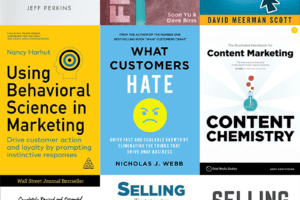Episode 34 of The Verblio Show
On this week’s episode of The Verblio Show, Steve talked with Scott Shrum the day after Scott’s winning Jeopardy! episode aired. Naturally, Steve asked about his experience on the show and got a crash course on the most efficient way of buzzing in, as well as marketing strategies from Scott’s time as president and COO of Hennessey Digital:
- How the agency has reached over $10 million in revenue by doing the same thing again and again
- Exactly how much content Hennessey is creating for their legal clients
- “Industrial grade SEO” and their “Skyscraper” content strategy
- How to niche up effectively
Plus, hear how improv has changed his management style, what the point of an MBA *should* be, and what he learned working at companies like The Motley Fool and S.C. Johnson.
Guest-at-a-Glance
Name: Scott Shrum
What he does: President and COO of Hennessey Digital.
Find Scott on the web: Hennessey Digital | LinkedIn | Twitter
Get smart: “If you just went to business school to learn specific hard skills, I think you’re missing the point. I went to learn how to think.”
Top Tips from This Episode
Take a cue from improv
Scott has done improv for many years, and one of the biggest lessons he’s learned is the idea of “Yes, and… .” As he describes it, “Whatever your scene partner says, you say yes—you acknowledge that that’s the reality—and you build on it.” Extending that idea to his professional life has helped him move away from focusing on why an idea might not work, to considering how it could.
It’s advice he often gives to his team, too. “I’ll notice they might be stuck in a scarcity mindset—‘Well, we can’t do that, we don’t have enough resources’ or ‘ Oh, that’s not gonna work because we tried that last year,’” he says. “And I will nudge them towards a ‘yes, and…’ mentality. ‘Well, what if we did try it? What if we just tried it for a month—what would happen?’”
Use content as a competitive advantage
Over the last year, Hennessey’s retention rate has been over 95 percent, a feat they have managed by giving their clients serious results through content. By publishing as many as 400 pages a month for a client, they’re capturing more relevant real estate on Google and building more traffic.
The typical page is 1000 words, and it generally answers a specific query their audience might be asking, such as “I just go into a car accident, what do I do?” By having an answer to those questions—and their variations—directly on their site, these clients are gaining valuable leads in the hyper-competitive legal space.
“Once they see it working, not only do they stick with us, but they inevitably want to go faster,” Scott says of Hennessey’s clients. At that point, they can publish more pages and do a more aggressive link outreach to get even more results.
Episode Highlights
The value of being a generalist
“Earlier in my career I wanted to be a specialist, but as I moved up and gained a little more experience I realized, no, there’s a lot of value in being a generalist—there’s a lot of value in being somebody who can think critically, who is good at working with different types of people.
I think I established kind of a personal brand of somebody who is comfortable dealing with the sales guys, but also comfortable talking to the engineers and talking to the finance people and talking to the lawyers. And then you pretty quickly realize those skills are transferable in nearly any industry.”
How Hennessey gets results for its legal clients
“We’ll take a look at their market, and the very first thing we’ll do is look at their competitors, and of course look at rankings… But we also look at how much real estate they have on Google. And we’ll look, ‘Hey, your number one competitor—yeah, he’s pretty far out there, but he’s only got 800 pages of content on his site. You’ve got 50, so you have a long way to go. But if we knuckle down and start doing this the way we do for other clients, you could catch him very quickly.’ And every one of those pages is a hook in the water for finding potential leads.
…So if somebody were to click, ‘I just got into a car accident. What’d I do?’ We create a page for the client that answers that question very directly. We’ll answer different flavors of that question. One of those pages might be what comes up in that relevant query. They click through, they fill out a form, now they’re on the phone with the attorney, and that lead could be worth thousands and thousands of dollars, all because we targeted those specific keywords.
That’s what we do over and over for our clients in every one of their geographies. And our best clients—the ones who are happiest—are the ones who are willing to go fast and go aggressive. And then they start seeing results and then they wanna go even faster.”
Geography matters
“In most markets, there is a minimum level to even get ignition. But in a lot of markets, depending on the practice area and depending on the geography, that minimum—that ante, that table stakes—is not 50 pages of content a month. In other places, even 25 pages a month might be an aggressive plan for that market.
And we even have some clients that are kinda small and they may have, for example, a corner of Ohio, and they’re doing very well in their corner of Ohio with 15 pages a month. And that’s the right size for them. So in that example, we don’t try to jam 50 or 75 pages of content a month on them to go way fast and build the tallest skyscraper in Columbus, Ohio, when that’s not even necessary. We absolutely do right-size it, for the geography or the practice area that they’re in.”
Why Hennessey has a one-page website
“Because the cobbler’s children have no shoes.
Our website has always been priority number six on the list. And, in fact, since I’ve been here, selling has never been our problem—it’s actually been trying to keep up with the growth. And we truly have grown by word-of-mouth. One of the things I observed when I first started talking to Jason before I joined the company, was the same one-page website we have now. And I said, ‘Wow, you’re like a speakeasy—it’s like people have to know your name, they’ve gotta know the code, just to even get in.’”
The point of business school? To learn how to think
“I met someone before I went to Kellogg who went to another business school, and I told him that I was applying, and he said, ‘Oh, I got my MBA, and it was just two years to learn how spreadsheets work, and it was $100,000.’ And I remember even at the time, before I went, thinking, ‘I don’t think you did business school correctly.’ And if you just went to learn specific hard skills, I think you’re missing the point. I went to learn how to think. I did learn some hard skills—we were just talking about finance and certain areas—but the classes that I got the most out of, by far, were the ones that changed how I thought.
I had a digital marketing background already at that time, and already in the previous five years, it had changed so much. And all the schools at the time were just scrambling to create their first online marketing classes, and I didn’t gravitate towards those at all. I was like, ‘Whatever they’re teaching is gonna be irrelevant in 18 months. I’m far more interested in the how you think type classes,’ and so I mostly focused on those.
And for any of the more specific skills, I think you’re better off reading an in-depth article, or a book that came out in 2020 because then in two years there’ll be a book in 2022 that you should read, that’ll be more relevant than what you read two years ago. So I think going to school just learn hard skills is not the way to go.”
On successfully niching up
“In my role as COO, I tend to be a bit of a killjoy in the company… Some people will get wide-eyed and be like, ‘Let’s get into that industry,’ and I’m like, ‘I don’t know that I wanna get into that industry.’ But the ones where I’m less uptight is because I know the core pieces of what we do are pretty transferable to those industries.”
The fastest way to buzz in on Jeopardy!
“You use your whole thumb. Instead of pushing the buzzer, you think of pulling with this muscle—the fleshy part of your thumb—and when you move that, your entire thumb moves, not just the tip of your thumb. And that is the way Fritz Holznagel says is the fastest, most repeatable way to ring in first on Jeopardy!”
Top Quotes
Scott:
[11:07] On getting into consumer internet at the very beginning: “I realized, it’s such a young market. I’m young, but if I get into that space now, no one will have more experience than I do.”
[21:04] “At GMC, they call themselves industrial grade—we’re sort of industrial grade SEO.”
[28:02] “Legal is like New York: if you can make it there, you can make it anywhere.”
[37:02] “If you just went to business school to learn specific hard skills, I think you’re missing the point. I went to learn how to think.”



